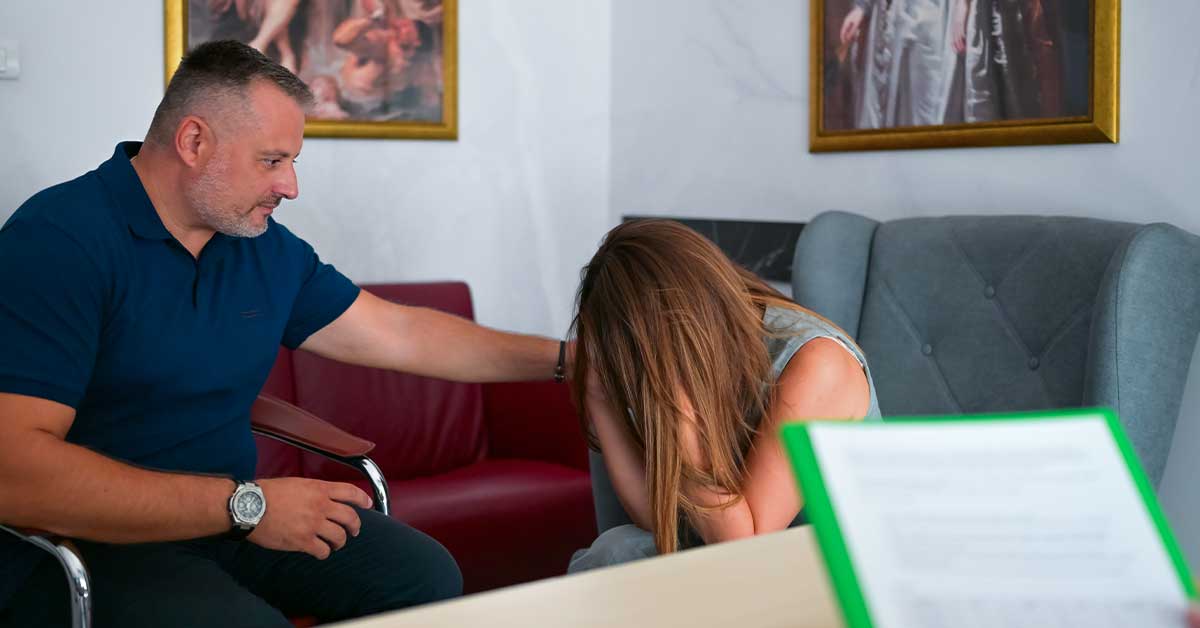Depression Treatment
Depression is not just a passing sadness or a simple reaction to difficult circumstances. It is a serious mental health condition that can affect anyone, regardless of age, gender, or life situation. People struggling with depression often feel trapped in their own thoughts, powerless to find a way out. Life loses its meaning, while everyday responsibilities and relationships become an unbearable burden.
Unfortunately, many people ignore the symptoms or dismiss them as “tiredness” or “just a phase”. However, depression rarely goes away on its own. The longer it lasts, the more it undermines mental and physical health, affects work, family, and friendships, and in severe cases may even lead to harmful thoughts of self-injury or suicide.
The good news is that depression can be treated. With professional support and properly guided treatment, it is possible to restore balance, regain energy, and once again find meaning and joy in life.
That is why it is important to recognise the problem, reach out to a professional, and take the first step towards recovery. You are not alone — a solution exists, and the very first step is making the decision to seek help.
What is Depression?
Depression is a serious mood disorder that affects a person’s feelings, thoughts, behaviour, and overall functioning. Unlike short-term sadness, which is a normal reaction to stressful events, depression lasts longer and has a stronger impact on daily life.
People suffering from depression often describe feelings of emptiness, helplessness, and a loss of interest in activities they once enjoyed. Everything that used to bring them happiness loses its meaning, and even the simplest tasks may seem overwhelming.
It is important to understand that depression is not a sign of weakness or a character flaw — it is a medical condition that can affect anyone. It develops as a result of a combination of biological, psychological, and social factors, and should not be ignored or endured without professional support.
Recognising depression and distinguishing it from ordinary sadness is crucial for beginning recovery. Sadness usually passes on its own, while depression can become chronic and more severe if left untreated. That is why it is essential to pay attention to the symptoms and seek help in time.

Causes of Depression
Biological causes
Psychological causes
Social causes
Chronic stress at work or within the family, financial difficulties, job loss, divorce, or the death of a loved one often act as powerful stressors that can trigger depression. Loneliness and a lack of social support make the situation even more difficult.
In most cases, depression develops as the result of a complex interplay of circumstances, and it is not something a person can simply “overcome” by willpower alone. Recognising the causes is the first step towards recovery, as it helps tailor treatment to the needs of each individual.
Symptoms of Depression
Depression symptoms can vary from person to person and may appear on a psychological, emotional, and physical level. They are often so pronounced that they interfere with daily activities and disrupt relationships with family, friends, and colleagues.
It is important to note that depression is not the same as temporary sadness or tiredness — the symptoms last for more than two weeks and are of strong intensity.
Psychological and emotional symptoms:
- Feelings of sadness, emptiness, hopelessness, or despair;
- Feelings of guilt and worthlessness;
- Loss of interest in activities that once brought pleasure;
- Constant worry, fear, and pessimism;
- Suicidal thoughts or preoccupation with death;
- A sense that life has no meaning.
Behavioural symptoms:
- Withdrawal from social interactions and avoiding contact with others;
- Neglect of personal hygiene and responsibilities;
- Difficulties at work and in social functioning;
- Loss of willpower and motivation for any activity.
Physical symptoms:
- Sleep disturbances (insomnia or excessive sleeping);
- Changes in appetite and body weight (weight loss or gain);
- Chronic fatigue, exhaustion, and weakness;
- Slowed movements and speech, or on the contrary, agitation and restlessness;
- Headaches, back pain, stomach problems without clear medical cause;
- Low sex drive.
Depression in Women, Men, and Children
Depression in Women
Symptoms commonly seen in women:
- Intense sadness and feelings of helplessness, often accompanied by hopelessness;
- Excessive and irrational guilt, even over things beyond their control;
- Constant worry, insecurity, and feelings of inadequacy;
- Frequent crying, often without an apparent reason;
- Social withdrawal, loss of interest in socialising and activities that once brought pleasure.
Women are generally more open than men in expressing their emotions, which can aid in earlier recognition of the problem. However, many women still minimise the seriousness of their condition. They often feel they “must be strong” for their family and others, which can prevent them from seeking professional help in time.
It is important to emphasise: depression is not a sign of weakness and does not mean you are not good enough. Every woman deserves support and help to regain her inner strength and joy in life.

Depression in Men
Anger, irritability, and aggression
Risk-taking behaviours and substance misuse
Physical symptoms
Withdrawal from family and social life
Men with depression may withdraw into themselves, lose interest in family activities, socialising, and hobbies. They often spend long hours alone, shut away in a room, avoiding conversation and contact with loved ones. This behaviour may be misinterpreted by others as “coldness” or lack of interest, when in reality it is a sign of depression.
Many men mistakenly believe that admitting a problem and seeking help is a sign of weakness. Because of this, depression in men often becomes more severe and can reach the point where suicidal thoughts appear.
Depression in Children and Adolescents
Unfortunately, depression does not only affect adults — children and teenagers can also suffer from this serious disorder. In younger people, symptoms often appear differently than in adults, which makes them harder to recognise. Children rarely know how to clearly describe their feelings, while adolescents often hide them out of fear or shame.
Parents and teachers are usually the first to notice changes in a child’s behaviour and mood, and their attention and quick response can be crucial for recovery.
- Irritability and anger instead of sadness – the child is often angry, defiant, or aggressive, even without a clear reason;
- Problems at school and declining performance – reduced concentration and motivation lead to poorer grades and disruptive behaviour;
- Withdrawal from play and socialising – the child avoids friends and stops taking part in activities they once enjoyed;
- Complaints of physical pain without medical cause – frequent headaches, stomach aches, or fatigue may be psychosomatic signs of depression;
- Changes in appetite and sleep – eating too little or too much, sleeping excessively, or struggling with insomnia;
How Long Does Depression Last?
One of the most common questions people struggling with this condition ask is: “How long does depression last?” The answer depends on many factors — the underlying causes, the intensity of symptoms, the level of support from the environment, and most importantly, whether professional help is sought in time.
Depression does not go away on its own, and the longer it is ignored, the more serious and difficult to treat it becomes.
Duration of depressive episodes
- On average, a depressive episode lasts between 6 and 8 months if left untreated.
- For some people, it may last only a few weeks, while for others it can persist for years, especially if it becomes chronic.
- In cases of seasonal depression (e.g. winter depression), symptoms appear during specific periods of the year and subside with seasonal changes.
- Postpartum depression usually lasts from several weeks to a few months, but it also requires professional attention.
Why Is Treatment Important?
Without proper treatment, depression can deepen, become more severe, and lead to serious consequences for both health and life. Treatment not only shortens the duration of depression but also reduces the risk of it returning in the future.
The sooner you recognise the symptoms and seek help, the greater the chances of a faster recovery and a return to a normal, fulfilling life.
What Does Depression Treatment Look Like?
Depression treatment is individual and tailored to each patient, as causes, symptoms, and intensity can vary greatly. It involves professional assessment, careful guidance through the recovery process, and a combination of different methods that together bring the best results.
The most important thing to remember: depression can be treated, and the first step is to seek professional help.
Diagnosis
Treatments
Treatment normally includes a combination of these methods:
Psychotherapy
Talking with a professional helps the patient understand their thoughts and feelings, identify the causes of depression, and learn how to cope with stress and challenges.
Pharmacotherapy (medication)
In some cases, a doctor may prescribe antidepressants to relieve symptoms and help the brain restore chemical balance. Medication is usually combined with psychotherapy for optimal results.
Psychological support and education
Support from family and loved ones, as well as learning new strategies for overcoming difficulties, play an important role in the recovery process.
Specialised medical treatments
In more severe cases, intensive medical programmes lasting from 7 to 21 days may be required in specialised clinics, where patients receive continuous professional care and full support.
How long does treatment last?
The duration of treatment depends on the severity of symptoms and the patient’s response to therapy. In mild cases, recovery may take several weeks, while in more severe cases the process can take longer. The key is to remain consistent with treatment and trust the process.
The shared goal of all treatments is for the patient to once again feel joy, energy, and meaning in life — to reconnect with themselves and their loved ones.

Why Is It Important to Seek Help?
Many people struggling with depression remain silent about their condition for a long time, believing it will “pass on its own” or that they must cope alone. Unfortunately, depression rarely improves without professional help, and the longer treatment is delayed, the deeper and more severe the symptoms become.
It is important to know: depression is not your fault, and it does not mean you are weak. Seeking help is a sign of courage and the first step towards recovery.
In the most severe cases, depression can lead to serious consequences, including suicidal thoughts. That is why it is crucial to act in time and surround yourself with people and professionals who understand what you are going through.
How Can We Help?
- Recognise and understand your condition;
- Find effective ways to manage your symptoms;
- Restore your self-confidence and inner strength;
- Enjoy life and relationships with others once again;